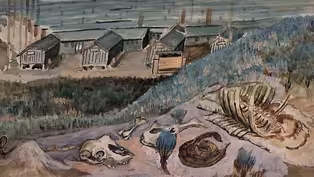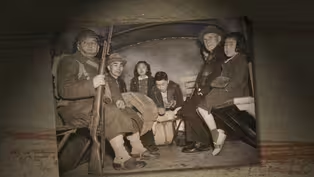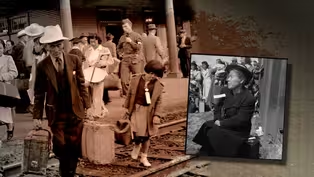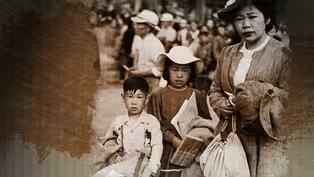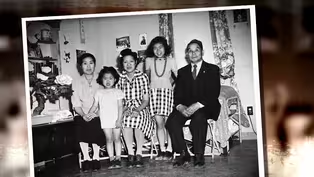Injustice at Home
No Place to Come Home To
Season 3 Episode 3 | 5m 29sVideo has Closed Captions
Incarceration camps closed, most Japanese Americans were not welcome to return home.
After the war ended, the incarceration camps were quickly closed down.The Japanese Americans were free to go. But to where? Most Japanese Americans had to start completely over. They had lost everything. Spokane in eastern Washington was thought to be a safe haven, but even there they were told "Japs Go Home!".
Problems playing video? | Closed Captioning Feedback
Problems playing video? | Closed Captioning Feedback
Injustice at Home is a local public television program presented by KSPS PBS
Funded by the Kip Tokuda Memorial Washington Civil Liberties Public Education Program, Washington State Office of the Superintendent of Public Instruction. Copyright 2018, Friends of KSPS, Spokane.
Injustice at Home
No Place to Come Home To
Season 3 Episode 3 | 5m 29sVideo has Closed Captions
After the war ended, the incarceration camps were quickly closed down.The Japanese Americans were free to go. But to where? Most Japanese Americans had to start completely over. They had lost everything. Spokane in eastern Washington was thought to be a safe haven, but even there they were told "Japs Go Home!".
Problems playing video? | Closed Captioning Feedback
How to Watch Injustice at Home
Injustice at Home is available to stream on pbs.org and the free PBS App, available on iPhone, Apple TV, Android TV, Android smartphones, Amazon Fire TV, Amazon Fire Tablet, Roku, Samsung Smart TV, and Vizio.
Providing Support for PBS.org
Learn Moreabout PBS online sponsorshipMore from This Collection
A study of the resettlement of Japanese Americans after WWII and the ongoing hardships and discrimination they experienced in the postwar years.
Video has Closed Captions
Takuichi Fujii used art to captured his experiences in Japanese American internment camps. (7m 35s)
We Only Took What We Could Carry
Video has Closed Captions
Japanese living on west coast forced to leave their homes with only what they could carry (8m)
Video has Closed Captions
Japanese Americans lost freedom, possessions, privacy and dignity when forced into camps. (6m 36s)
Video has Closed Captions
"Shikata ga nai, you can’t help this, you can’t change this, so make the best of it." (6m 4s)
Providing Support for PBS.org
Learn Moreabout PBS online sponsorship(peaceful music) (singing in foreign language) - [Narrator] After the war ended, the incarceration camps were quickly closed down.
The Japanese Americans were free to go.
But to where?
- [Alice] 'Cause there was nothing to go back to.
They lost everything.
- [Narrator] Most Japanese Americans had to start completely over.
They had lost everything.
Their farms, stores, businesses and hotels were gone.
Many had lost all their money.
- [Doug] Many of them were real successful business people who essentially lost everything they had.
- [Narrator] To make matters worse, it was unsafe to return home.
Hostility towards the Japanese Americans were at an all-time high.
- [Doug] People's houses were painted over and there were signs that said, you know, no Japs in my neighborhood, or go home Japs.
- [Kara] And when you came back every sign in our small town of Wapato was no Japs wanted.
- My family was unsure of what to do after the war, and we were able to stay in the internment camp until, I think the last people had to leave in October, and so were one of the last people to leave, because I don't think they knew what to do.
- [Narrator] Some Japanese Americans decided to move to Spokane in eastern Washington.
- Spokane was probably the safest haven they could think of moving to.
But there was still bigotry.
There's still racism.
There was still a backlash from the end of the war.
- We were discriminated quite a bit, you know.
Jobs weren't easy to get, even restaurants boycotted us.
There was a barber shop, too, said, no Japs allowed.
- It was very obvious of course, even when they returned from camp, that no matter where you went there was still discrimination and bias.
- There were, oh, about five Chinese restaurants, you know, and they would put up signs, we are Americans, no Japs allowed, you know.
And we used to eat there all the time to get noodles, but after the war, they wouldn't allow us in there.
(melancholy music) - [Narrator] The Japanese Americans were treated as second class citizens.
Good jobs were practically impossible to find.
- This is a man who had a university education.
He could not get a job for years.
He worked with my uncle in their laundry.
You know, and this is a man who's, you know, incredibly educated and he was just bitter that he could not get a job.
- I wanted to become a nurse and I couldn't get into any of the schools because of my Japanese heritage.
That's when I really felt discriminated, being Japanese was really a disadvantage.
- [Narrator] Housing was also limited for the Japanese Americans.
- Real estate companies, more or less, had a color line.
You can only buy houses up a certain street.
- [Narrator] Despite their freedom from the camps, Japanese Americans were still restricted and discriminated against for decades after the war had ended.
Even as late as the 1960s, civil rights activist Denny Yasuhara complained to the Washington State legislature that there were still over 500 federal, state and local laws aimed directly at the Japanese Americans.
It was not until the Reagan administration in the 1980s that reparations were made to the Japanese Americans for their treatment during World War Two.
But by then, most of the older Japanese Americans had passed away.
(melancholy music) (peaceful music)
Support for PBS provided by:
Injustice at Home is a local public television program presented by KSPS PBS
Funded by the Kip Tokuda Memorial Washington Civil Liberties Public Education Program, Washington State Office of the Superintendent of Public Instruction. Copyright 2018, Friends of KSPS, Spokane.
